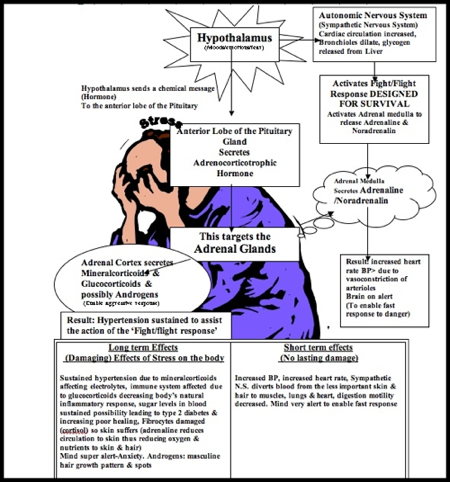ENDOCRINE SYSTEM PART ONE
 |
| DIAGRAM OF THE ENDOCRINE GLANDS |
It is often said that it is the Pituitary Gland that controls the Endocrine system however this is not strictly true although it plays a big part in it. It is the area of the brain known as the Hypothalamus that maintains homeostasis (balance) within the body and one of its functions is to regulate the pituitary gland. You can see from the diagram above the Endocrine system organs which are known as ductless glands meaning their hormones (chemical messengers) are excreted directly into the blood and not through a duct.
As the Hypothalamus is trying to maintain balance within the body it is constantly check our blood analysing what's needed to help it function at its best so if it detects a fall in certain hormones it will send a message to the pituitary gland say and that pituitary gland will send a hormone to its target organ for example Thyroid Stimulating Hormone that is then excreted into the blood stream to target the Thyroid gland to produce Thyroxine, the Hypothalamus will be constantly checking levels of Thyroxine in the blood and when the levels are correct, it will send a message to the pituitary gland to stop secreting Thyroid Stimulating Hormone and if the levels drop again the same thing happens all over again. This is known as a 'Feedback System' and that is basically how our hormone levels are maintained.
Obviously the subject matter of the Endocrine system is vast and I am only giving the basics and keeping it simple but one thing that affects us all is stress and the endocrine system really is worked.
CORTISOL OFTEN KNOWN AS THE 'STRESS HORMONE'

Cortisol is a steroid hormone produced within the adrenal cortex in the adrenal glands, these are cone shaped organs sitting on top of the kidneys. It's a very important hormone and responsible for proper glucose metabolism, helping regulate blood pressure, has a part to play in insulin and blood sugar levels and is part of the inflammatory response. It's often known as the stress hormone but as you can see that's only part of its functions, and this is because it's secreted in higher levels as part of the 'Fight or Flight response'. When secreted in short bursts its beneficial to the body as due to it's actions, it helps mobilise energy reserves, heightens memory and lowers response to pain. This is how and why it's beneficial in the 'Fight and Flight response', it acts quickly and helps survival, however today's stresses are not the same as yesteryear and therein lies the problem.
When there is prolonged secretion of this hormone, when stress is on going, it causes blood sugar imbalances, affects bone density, causing it to decrease and also causes a decrease in muscle tissue. It raises blood pressure affects the body's immune system making us more susceptible to infection and leads to poor healing. It also causes shifts in body fat by increasing more fat around the abdominal areas and leads to higher levels of cholesterol.
The Hypothalamus & the Relationship to the Endocrine System in ‘Stress’
Below the flow chart illustrates how our minds' emotions and feelings trigger a reaction in the Hypothalamus to instigate what happens in the 'Fight or Flight' response. The Hypothalamus then in turn influences both the Autonomic Nervous System and the Endocrine system. This is fine short term it helps us cope in dangerous scenarios and was designed as a protective response, however the stresses of today are not those of yesteryear. No harm comes to our bodies in the short term, this is not the case in long term stress. All is not lost for there are ways we can influence the Hypothalamus to prevent the long term damaging effects of stress on our health. I shall be exploring this under Holistic Therapies.

Maggie Brown (Author)
Find all the books, read about the author, and more.
 Top Stories
Top Stories








